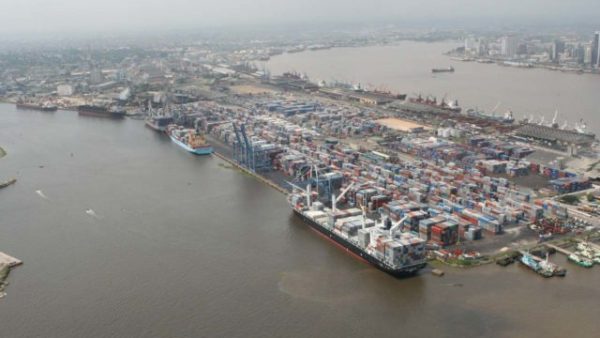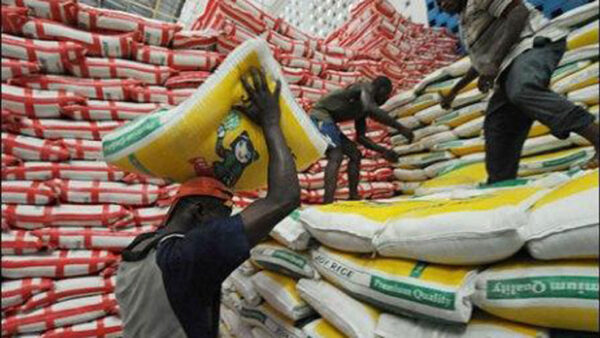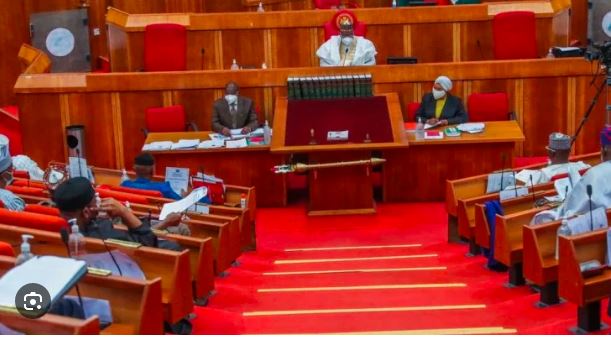Lagos Port Crisis: Over 50 Illegal Checkpoints On Lagos Port Corridors
 . NPA’s anti-corruption squad helpless as extortion persists
. NPA’s anti-corruption squad helpless as extortion persists
· Manual truck call-up system – dead on arrival
· ‘Nigerian port recovery charge’ influenced by NPA, NIMASA – PTML
By Kenneth Jukpor
Despite the genuine efforts of the Nigerian Ports Authority (NPA), truck owners as well as other port users to ease the flow of traffic on the Lagos port access roads, the problem of extortion has continued to increase as MMS Plus investigations have revealed that there are over 50 illegal checkpoints on the Lagos port corridors.
These checkpoints have become extortion points for the military taskforce personnel deployed to ease the flow of traffic while touts haven’t been left out of the extortion exercise as truck-drivers are fleeced at every checkpoint.
Over fifteen illegal checkpoints exist between Ijora and Apapa, while the figure increases to twenty-two at night from 7pm. Similarly, another thirteen extortion checkpoints exist between Mile 2 – Tin Can – Liverpool route; while eight checkpoints were counted by our correspondent on Mile 2 to Ajegunle (Boundary) route. Mazamaza to Kirikiri axis also recorded another nine checkpoints.
These points of extortion have become an impediment to the efforts of NPA and port stakeholders to curb the gridlock even as NPA has started a manual truck call-up system to dissipate traffic caused by the haphazard movement of trucks along the port access roads in Lagos.
During an exclusive chat with MMS Plus, the President-General of the National Association of Air Freight Forwarders and Consolidators (NAFFAC), Prince Adeyinka Bakare said; “We have 15 checkpoints and when it gets to 7pm, it increases from 15 to 22 and at every point, a truck driver must part with something. I can name the spots where you have these checkpoints”
Bakare who was assessing the viability of the manual truck call-up system recently introduced by NPA, maintained that the traffic gridlock at Lagos port access roads would remain until the opportunities for extortion are eliminated.
“We have created businesses for some people and until this issue is resolved, we cannot solve the problem on ground” he added.
Speaking with MMS Plus on this issue, the President of Corporate Truck Fleet Owners Association, Mrs. Folake Soji-George lamented that the taskforce set-up by the government to diminish truckers’ plight have compounded the problem.
“In Nigeria when government sets up an agency to come and ameliorate suffering, they are the ones that will compound the sufferings one way or the other for pecuniary gains. I believe that Nigerians are always in too much hurry. You find that most people are self-centered and this caused the problem of extortion” she said.
Speaking further, she said; “Nobody has ever collected N20,000 or N30,000 or N70,000 or N80,000 from me. I would not pay, for what reason! It is probably because somebody is in a hurry because I also took it upon myself to interview some people that have one or two trucks and they told me “madam, it’s because you have fleet, nobody will ask you for money, because you have fleet, you can do this, you can do that but for them, they want to work and they cannot afford to stay for two weeks or one month without jobs so they will go and offer somebody money. Who will you offer money that won’t take?”
Meanwhile, the Vice Chairman, Nigerian Association of Road Transport Owners (NARTO), Dry Cargo wing, Alhaji Inuwa Abdullahi told our correspondent that the number of extortion points around the ports have become too numerous to count.
“These are the problems that we encounter on daily basis. I have received complaints today of extortion despite the launch of the manual truck call-up. I’ll continue to plead with the media to publish and put these issues in the limelight until the extortion stops” he said.
However, Inuwa explained that beyond the extortion the manual truck call-up system may be ineffective because the call-up system only favours truck-owners resident in Lagos.
“The manual truck call up system is a good initiative which NARTO supports. The programme, if well managed, can eliminate the problem of trucks on the port access roads without any reason to be there. However, the call-up system favours truck owners resident in Lagos who have truck parks or can easily access the commercial truck parks. How about the large percentage of trucks coming from outside Lagos with little information about available truck parks or the decision to utilize manual truck call-up system? Since these trucks are heading to Lagos from other states they are likely to remain on the roads.” he said.
According to Inuwa, NARTO has held meetings with NPA and suggested that such category of truckers utilize truck garages in Ogere even as they advised the terminal operators to expand the manual truck call-up to get to such facility.
However, he maintained that the major problem that led to the gridlock on the Apapa and Tin Can port access roads was the issue of empty container and the lack of empty container holding bays by shipping companies. He noted that the lasting solution to the Apapa gridlock would be provision of holding bays with the capacity to absorb the empty containers.
Noting that an Anti-Corrupt Committee was instituted by the Lagos Port Complex of NPA to curb the extortion of truckers along the port access roads, Mrs. Soji-George explained that the anti-corrupt committee had limitations.
“The LPC Port Manager flagged off an anti-extortion committee but the committee has limitations. The taskforce is not under LPC purview, LPC’s purview is Eleganza which is from NIMASA down to the port. So, what about the other routes? From Liverpool to Apapa gate is N30,000 if you are carrying container and it happened to me. We carried a container on Monday (last week), we wanted to go and drop empty. We had our call-up to drop the empty at Liverpool, but my staff called me that they were asking them for N10,000 and if you don’t pay the N10,000, they will turn them but that is not under the purview of Apapa port that has set up anti-extortion committee” she said.
“What the agencies are saying in essence is that, if you report, we will follow suit to make sure that we dismantle such system. Those that are concerned, they don’t want to report because they think they want to go quickly but the thing is eating into their profit because if somebody collects N30,000 from a job of N150, 000, minus diesel, minus driver’s commission, minus over head cost; how much do you have left to operate with?” she queried.
Prior to the launch of the manual truck call-up system, the Chairman, Association of Maritime Truck Owners (AMATO) Chief Remi Ogungbemi had confided in MMS Plus that he anticipated a great resistance to the system by those who were benefiting from the Apapa traffic gridlock.
Ogungbemi opined that the call-up system could usher-in a more conducive environment for truckers to operate, but lamented that some terminal operators and shipping companies were benefitting from the traffic gridlock, adding that he wouldn’t be surprised to see some resistance to the new development by these companies or their agents.
He also noted that other corrupt individuals who extort truckers and make money from the current state of the port access roads would resist the change.
‘Nigerian Port Recovery Charge’ Influenced By NPA, NIMASA – PTML
Following the myriad of complaints by port operators that some of the charges collected by terminal operators were frivolous, the Port Manager of the Ports and Terminal Multiservices Limited (PTML) Mr. Babatunde Keshiro has said some of the charges were collected as a result of the excessive charges by the Nigerian Ports Authority (NPA) and the Nigerian Maritime Administration and Safety Agency (NIMASA).
Keshiro was speaking to MMS Plus to clarify issues following our Lead Story last week titled; “Illegal Port Levies: Shipping,Terminal Coys Introduce New Charges” where port users lambasted PTML for strange charges such as; Terminal delivery charges, Nigerian port recovery charges, customs examination charges, bill of lading documentation charges, among others.
“The Nigerian Port Recovery charge is to take care of additional charges paid to NIMASA and NPA by Shipping lines for extra service charges aside the regular tariff such as NIMASA (Maritime fund Levy, Sea protection Levy while NPA applies Stowage Charges) all in USD$. NIMASA regular tariff is 0.3% of freight earned by Shipping Lines. NPA regular tariff for shipping lines are ship dues based on GRT and cargo dues or stevedoring charges based on cargo type” he said.
According to the PTML Boss, the charges were not new charges but a reflection of the review on the charges earlier collected by NPA when it managed the ports prior to the port concession.
“All charges highlighted are not new as the template used today by terminal operators are template in NPA revised tariff of 1993 and 2001. Terminal Handling, Delivery, Customs Examination, Documentation, Storage charges are all historically charged by NPA as terminal operator and surely, there is time value and variance in costs structure and pricing mechanism as certainly rate of inflation, interest rates, rate of exchange, Gross Domestic Product (GDP), among others are never static” he said.
Keshiro stated that it was erroneous to refer to such charges as ‘arbitrary’ because the charges are consistent with the practice in the trade.
On the issue of provisional charges, the PTML boss maintained that the provisional demurrage wasn’t illegal, arguing that the fee would be refunded if the empty containers are returned on time.
When contacted on the issue of terminal charges, the Legal Adviser and Company Secretary of ENL Consortium, Barr. Boye Uzamot stated that questions on the charges labeled ‘Nigerian ports’ collected by terminals should be directed at NPA.
Uzamot maintained that ENL published its charges on its website and admonished operators to come forward with complaints on any problematic charge.
“I can’t speak for NPA or Customs but if there is a specific charge that the operators feel ENL has charged, I would admonish them to come forward. Let me also inform you that our tariff rate and explanation of such charges is published on our website. So, it is a public document” he said.







